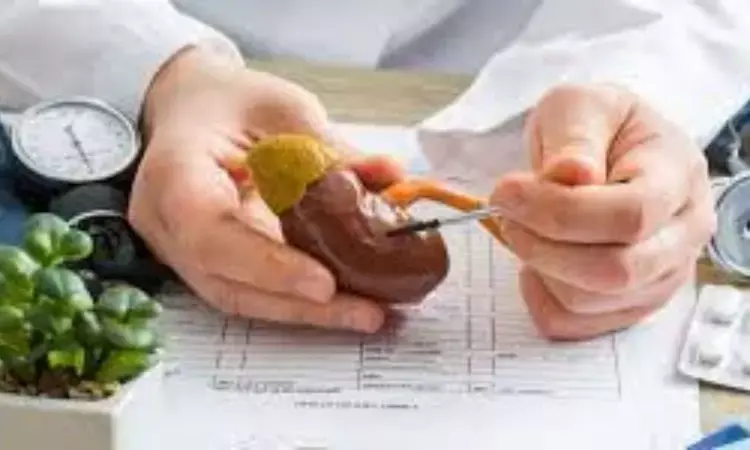- Home
- Medical news & Guidelines
- Anesthesiology
- Cardiology and CTVS
- Critical Care
- Dentistry
- Dermatology
- Diabetes and Endocrinology
- ENT
- Gastroenterology
- Medicine
- Nephrology
- Neurology
- Obstretics-Gynaecology
- Oncology
- Ophthalmology
- Orthopaedics
- Pediatrics-Neonatology
- Psychiatry
- Pulmonology
- Radiology
- Surgery
- Urology
- Laboratory Medicine
- Diet
- Nursing
- Paramedical
- Physiotherapy
- Health news
- Fact Check
- Bone Health Fact Check
- Brain Health Fact Check
- Cancer Related Fact Check
- Child Care Fact Check
- Dental and oral health fact check
- Diabetes and metabolic health fact check
- Diet and Nutrition Fact Check
- Eye and ENT Care Fact Check
- Fitness fact check
- Gut health fact check
- Heart health fact check
- Kidney health fact check
- Medical education fact check
- Men's health fact check
- Respiratory fact check
- Skin and hair care fact check
- Vaccine and Immunization fact check
- Women's health fact check
- AYUSH
- State News
- Andaman and Nicobar Islands
- Andhra Pradesh
- Arunachal Pradesh
- Assam
- Bihar
- Chandigarh
- Chattisgarh
- Dadra and Nagar Haveli
- Daman and Diu
- Delhi
- Goa
- Gujarat
- Haryana
- Himachal Pradesh
- Jammu & Kashmir
- Jharkhand
- Karnataka
- Kerala
- Ladakh
- Lakshadweep
- Madhya Pradesh
- Maharashtra
- Manipur
- Meghalaya
- Mizoram
- Nagaland
- Odisha
- Puducherry
- Punjab
- Rajasthan
- Sikkim
- Tamil Nadu
- Telangana
- Tripura
- Uttar Pradesh
- Uttrakhand
- West Bengal
- Medical Education
- Industry
Renal transplantation- Recommendations for enhanced recovery after surgery

UK: A recent article published in the British Journal of Surgery has reported Enhanced recovery after surgery (ERAS) protocol recommendations for kidney transplantation.
Enhanced Recovery After Surgery protocols are used widely in major surgery and improving postsurgical outcomes. However, due to challenges in evaluating their safety and efficacy, uptake of these programs has been slow in kidney transplantation. There has been no guidance and protocols specific to ERAS in kidney transplantation surgery to date. In the article, Jaimee H S Tan, Manchester Royal Infirmary, Manchester University NHS Foundation Trust, Manchester, UK, and colleagues aimed to summarise current evidence in the literature and develop ERAS protocol recommendations for recipients of kidney transplantation.
The researchers searched the online databases up to August 2021, for studies relevant to ERAS protocols in kidney transplantation. For each recommendation, a secondary search was repeated to explore the availability of specific evidence for each section of the protocol. Randomized controlled trials, case-control, and cohort studies were included.
The Grading of Recommendations, Assessment, Development and Evaluations (GRADE) framework was used to evaluate the quality of evidence available and recommendations.
Preoperative counseling and education
Preoperative education and counseling on postoperative care regimens, potential complications is recommended, and how to reduce/manage them.
Preoperative optimization
Prehabilitation programs are recommended to improve frailty issues.
Carbohydrate loading
Carbohydrate loading before operation can be safely given to non-diabetic kidney transplant recipients.
Fluid management
A goal-directed fluid therapy strategy is recommended over liberal fluid therapy with dynamic monitoring.
Local anaesthetic wound infiltration
Transversus abdominis plane (TAP) block is recommended to reduce reliance on opioid analgesics.
Catheter and drains
Catheter removal as early as possible is recommended to reduce the risk of urinary tract infection (UTI). Prophylactic drain insertion does not appear to confer any benefit.
Physiotherapy and early mobilization
Early mobilization is recommended to reduce complications, hospital, and overall recovery time.
Diet, laxatives, and bowel movement
Early resumption of the diet is recommended with active measures to manage emesis.
Ureteric stent management
Prophylactic ureteric stenting may reduce post-transplant urological complications but early removal is advised.
Postoperative counseling and education
Education and counseling on medication regimens, lifestyle advice, and smoking cessation programs are recommended (where indicated).
The researchers wrote in their conclusion, "the evidence base for ERAS in kidney transplantation is scarce compared to other surgical specialties, with further room for research and development." However, with the application of the currently available evidence, significant improvements to patient outcomes are already possible."
"This has shown that ERAS in kidney transplantation surgery is safe and feasible, with improved postoperative outcomes."
Reference:
Jaimee H S Tan, Kailash Bhatia, Videha Sharma, Mruthunjaya Swamy, David van Dellen, Raman Dhanda, Hussein Khambalia, Enhanced recovery after surgery recommendations for renal transplantation: guidelines, British Journal of Surgery, 2022;, znac325, https://doi.org/10.1093/bjs/znac325
Dr Kamal Kant Kohli-MBBS, DTCD- a chest specialist with more than 30 years of practice and a flair for writing clinical articles, Dr Kamal Kant Kohli joined Medical Dialogues as a Chief Editor of Medical News. Besides writing articles, as an editor, he proofreads and verifies all the medical content published on Medical Dialogues including those coming from journals, studies,medical conferences,guidelines etc. Email: drkohli@medicaldialogues.in. Contact no. 011-43720751


